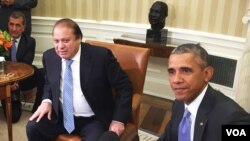U.S. President Barack Obama welcomed Pakistani Prime Minister Nawaz Sharif to the White House Thursday, with renewed promises to strengthen a relationship viewed as the best hope to brokering peace in Afghanistan.
The two leaders emerged from an Oval Office meeting announcing no timeline for stalled peace talks, nor any major breakthroughs on other items that topped their agenda, including concerns about the growth of Pakistan's nuclear arsenal. Instead, they touted new initiatives on trade, clean energy and education for women.
In brief pleasantries before their meeting, Obama said, "Obviously the United States and Pakistan have a longstanding relationship, work and cooperate on a whole host of issues. We are looking forward to using this meeting as an opportunity to further deepen the relationship."
Sharif noted the depth of bilateral ties, saying, "The Pakistan-America relations stand over 70 years, and it is my endeavor to further strengthen and solidify this relationship."
The White House is trying to pressure Pakistan to play a major role in Washington's newly revised plans to end the 14-year war on Pakistan's doorstep.
Obama last week reversed his pledge to pull American troops out of Afghanistan before he leaves office - an acknowledgment that the country still teeters on the edge of stability. With that decision settled, U.S. officials now hope to focus on political strategies for peace, including coaxing Pakistan toward reviving peace talks that have been stalled since the summer.
A joint statement released by the two leaders noted Obama "commended" Pakistan for hosting the talks in July.
The Sharif visit highlights the complex alliances in the war that Obama inherited in 2009, escalated a year later with a surge of American troops designed in part to force the Taliban to the negotiating table, and then vowed to end before he leaves office in January 2017. Instead, Obama announced plans to keep 5,500 U.S. troops there beyond 2016 to continue training and advising Afghan forces and to hunt al-Qaida terrorists.
Pakistan hosted a landmark set of preliminary meetings between Afghan officials and the Taliban in July. But a second round of scheduled talks was postponed after the Afghan government revealed that Taliban leader Mullah Mohammad Omar had died in a Pakistani hospital two years ago.
Earlier this month, Sharif said his government was trying to revive the negotiations between representatives of the Afghan government and the Taliban. But those talks are complicated by accusations in Kabul that Pakistan is playing a double game by cooperating with Washington but also sheltering Taliban leaders.
The U.S.-Pakistan relationship has been rocky over the years, in part because of U.S. concerns about the growth of Pakistan's secretive nuclear arsenal.
In a new report released Thursday, two authoritative nuclear analysts estimated that Pakistan's nuclear weapons stockpile has increased to between 110 and 130 warheads from an estimated 90 to 110 in 2011. The analysts, Hans Kristensen and Robert Norris, foresee it possibly expanding further to 220 to 250 warheads in another 10 years. That would make Pakistan the world's fifth-largest nuclear weapons state behind the United States, Russia, China and France.
The U.S. would like to work toward an agreement on nuclear weapons, but the White House downplayed expectations for any deal soon.




